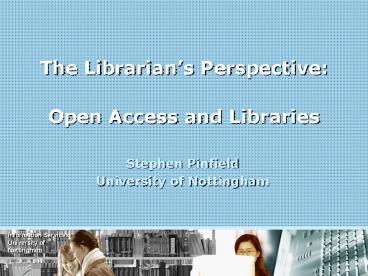The Librarians Perspective: Open Access and Libraries - PowerPoint PPT Presentation
1 / 15
Title:
The Librarians Perspective: Open Access and Libraries
Description:
'Any changes in library services arising from OA developments' ... Provision of additional indexes and bibliographies. Physical preparation of materials ... – PowerPoint PPT presentation
Number of Views:59
Avg rating:3.0/5.0
Title: The Librarians Perspective: Open Access and Libraries
1
The Librarians PerspectiveOpen Access and
Libraries
- Stephen Pinfield
- University of Nottingham
2
The brief
- The library perspective on OA developments
- How OA may help information provision
- Any changes in library services arising from OA
developments - What should be the role of libraries in the
internet age? - What are the issues to be addressed to help the
range of stakeholders involved?
3
Key points
- OA has the potential to bring benefits to the
research community and society in improving
information provision - If there was widespread OA, there will be less
library-based activity at institution-level, and
more information management at supra-institutional
/national level - However, institutional libraries will continue to
have an important role in - managing purchased/licensed content
- managing institutional digital assets
- supporting the use of content in teaching and
research etc - Libraries can work within their institutions to
help resolve current problems relating to the
implementation of OA policies/practices
4
OA and information provision
- Deeper narrow-casting and wider broadcasting
- Greater impact citations and other impacts
(social and economic) - need more analysis
- Not just about access to content but doing useful
things with it - searching
- text mining
- citation/impact analysis
- automated plagiarism detection
- Correcting dysfunctional market
5
Benefits of OA repositories
- Additional benefits
- Rapid dissemination
- Can happen now
- no new business model required in short-term
- relatively low-cost
- Interoperable
- Institutional benefits for IRs
- profile raising
- knowledge management
- strategic tool
- compliance/quality assessment
6
Open access
- Current research output
- journal articles
- book chapters
- e-prints
- Data
- research data sets
- Historical monographs
- Google Book Search
- Microsoft/OCA
- Other institutional assets
- e-theses
- learning objects
7
The role of libraries
- Traditional paper-based published content
- Selection of materials
- Procurement of materials
- Cataloguing and classification
- Provision of additional indexes and
bibliographies - Physical preparation of materials
- Access arrangements
- Circulation services
- Ongoing collection management
- Support and training of users
8
Role of libraries in HEIs
P Printed material E Electronic (purchased)
material OA Open access material
9
Role of libraries in HEIs
P Printed material E Electronic (purchased)
material OA Open access material
10
Role of libraries in HEIs
P Printed material E Electronic (purchased)
material OA Open access material
11
New roles
- Network level
- Repositories
- Service providers (OAI)
- metadata normalisation/enhancement
- automatic indexing
- searching
- citation analysis
- text/data mining
- subject gateways
- overlay journals
- Institutional level
- Repositories managing institutional information
assets (text, data etc.) - technical infrastructure
- facilitating deposit
- metadata production/enhancement
- content analysis/knowledge management
- digital preservation, etc.
- Content expertise for teaching and research
12
The future role of the library
- Jerry D Campbell
- Providing quality learning spaces
- Creating metadata
- Offering virtual reference services
- Teaching information literacy
- Choosing resources and managing licences
- Collecting and digitizing archival materials
- Maintaining digital repositories
- Others?
- Educause Review, January/February 2006, 16-30
13
IR and the library
- The Library is the natural part of the
institution to run the IR. The library - serves all the University
- is seen as neutral
- has expertise in information management
- has a commitment robust service provision
- has a stewardship culture
- is used to taking an institutional view
14
The library and institutional policy
- Current issues examples
- Facilitating cultural change
- Institutional procedures for implementing
funders self archiving policies - technical
- cultural
- policy
- Institutional arrangements for funding
publication/OA charges - Preservation of content
- Partnership with external stakeholders,
particularly publishers and funders - policies
- business models
- data analysis
15
Key points
- OA has the potential to bring benefits to the
research community and society in improving
information provision - If there was widespread OA, there will be less
library-based activity at institution-level, and
more information management at supra-institutional
/national level - However, institutional libraries will continue to
have an important role in - Managing purchased/licensed content
- Managing institutional digital assets
- Supporting the use of content in teaching and
research etc - Libraries can work within their institutions to
help resolve current problems relating to the
implementation of OA policies/practices































